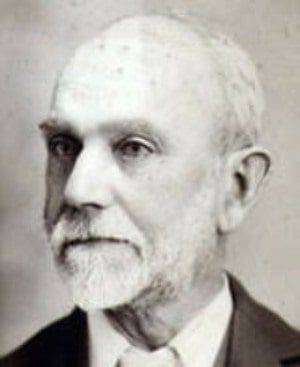Alfred Neobard Palmer. AN, Alfred or Alf to his mates, was a renowned historian, an industrial chemist and wrote more than 10 books. He was Wrexham’s first real historical scholar.

You may recall that a bronze plaque commemorating Palmer hung in the entrance room to Wrexham Library for many years. It dates back to 1922 and had been previously in the old library before being moved to the present one. It now sits on the back wall of the Wrexham Museum archives search room.
Palmer was born in Norfolk on July 10th, 1847. His first achievement of note was when he won the Bell Scholarship of the Pharmaceutical Society as an apprentice to a pharmacist in Bury St Edmunds. He was employed as a chemist. Moved to London, then Manchester before being appointed chemist at a mineral water works in Pentre Felin, Wrexham in 1880.
An Introverted Nature
He went on to set up his own practice at his home before opening an office at 34A Chester Street. This didn’t prove as successful as he had hoped it to be, however. He was said to have ‘less time for people than he would admit to their face’. His introverted nature and financial constraints meant he no longer wanted to have his own practice.
This led to him finding employment as an industrial chemist at Brymbo Steelworks. He later spent 13 years as an analytical chemist at the Cambrian Leather Works. The reason he has been honoured in bronze isn’t down to his work in the field of chemistry, it’s his historical knowledge and love of Wrexham that has left a lasting legacy.
So Why Go from Chemistry to History?
Palmer was said to be ‘a strange man, whose mind was constantly searching and thinking things over’. This restlessness and a natural instinct to explore meant his desire to find out more about the place he was living in wasn’t so unusual. His need to find the truth led him to write several books about the local area with a thoroughness the like of which had never been seen before!
He wrote 10 books in total, the first of which was ‘The Town, Fields and Folk of Wrexham in the Times of James I’. The book wasn’t successful and in truth left him out of pocket, as did many of his books. It was his love of what he was doing which led him to pen the others, including ‘A History of the Parish Church of Wrexham.’
Success Proves Elusive
To hone his craft, he walked endless miles and worked incredibly long hours. He studied ancient deeds, wills, parish registers and manuscripts to ensure his works were always remarkably thorough. This all took its toll though and it’s fair to say that every book he wrote affected his health. He was left drained by the hours he was dedicating and he was also struggling financially. At one stage he even wrote a novel – ‘Owen Tanat’. He hoped that this more lucrative market would help cover the costs of his other works. Sadly, the novel flopped.
Palmer’s loyal friend, Edward Owen decided to take matters into his own hands and secured him a pension on the Civil Lists for his efforts.
Wanting the Best for Wrexham
In 1892, Palmer started his campaign for Wrexham to have its own museum. He didn’t ask for too much. He wrote to the Free Library Committee to ask them to place a display case in the library as the first step to establishing a museum. Eight years later he was still lobbying the librarians and an article appeared in the Wrexham Advertiser describing Mr Palmer as ‘the driving force behind the idea of setting up a museum’.
It took another 80 years for Wrexham to consider the proposal formally. More than another decade to find a building and finally in 1996, 104 years after Alfred launched his campaign. Wrexham Museum opened on Regent Street!
A Lasting Legacy
Until Palmer, there had been very little written down about our local history. Palmer worked frantically to find his information at a time when there was no Welsh University, no National Library and no County Record Offices. It’s a real shame that Palmer wasn’t appreciated in his lifetime. As his friend Edward Owen put it: ‘the man who was unquestionably the foremost historical scholar in Wales of his day went to his grave disregarded’.
In 1915, the University of Liverpool awarded him an honorary degree. But he died on March 6th before he could receive it.
It’s rather fitting that he’s now celebrated in the museum he so long campaigned for. Today, amazing artefacts such as The Bronington Hoard and the bronze-age Rossett lock rings are no longer lost, but are displayed locally for everyone to enjoy, just as Alfred would have wished.
So, the next time you’re listing famous Wrexhamites, don’t forget to include a certain Alfred Neobard Palmer!
All this information was taken from books and articles in the Wrexham Museum archives search room. It’s a great place to visit if you want to explore our local history.
We thank wrexham-history.com for this article.

